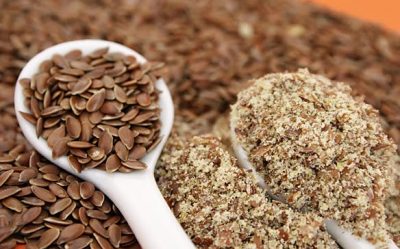A recent study in the Journal of Medicinal Food demonstrates that daily consumption of flaxseeds may be safer and more effective than drugs and surgery for treating benign prostatic hyperplasia (BPH), the most common prostate issue.[1]
It’s estimated that BPH afflicts nearly 50% of all men by the time they reach the age of 80. Surveys of data show that the adoption of an unhealthy Western lifestyle (and even a Western approach to medicine) are correlated with a rapid rise in the incidence of the condition.
BPH is characterized by an enlarged prostate. Common symptoms include frequent, urgent need to urinate, nocturia (nocturnal urination), decreased or intermittent stream, and the sensation of never being able to fully empty the bladder.
While these symptoms can be a mere inconvenience (especially in their most mild form), BPH should be addressed—experts believe there’s no conclusive link between BPH and prostate cancer risk, but BPH can nevertheless signal overall imbalance in the body.[2]
For example, obesity, diabetes, inactivity, and heart disease are all prominent risk factors for BPH. It stands to reason, then, that BPH is a sign of the same underlying imbalances that lead to these other conditions. While genetics have a role to play, risk level is much more heavily determined by lifestyle—which means that lifestyle modification can also help prevent and even reverse such conditions.
A misguided approach
As usual, though, conventional medicine largely ignores lifestyle modification as a means for treating BPH, and instead relies on drugs and surgery. The risks, side effects, and comparative ineffectiveness of these interventions are well-known in the natural health community—and these drawbacks are even more pronounced in the case of BPH treatment.
Drugs for BPH come with their own risk. The alpha adrenergic blockers and 5a-reductase inhibitors prescribed for BPH carry the risk of all sorts of side effects, including blood pressure irregularity and “retrograde ejaculation,” which can lead to infertility.[3]
Surgery is not much better. The complications from surgical transurethral resection of the prostate (TURP) are even more varied and common, so much so that there’s a collective name for them: TURP syndrome.
Luckily, the new research mentioned above suggests that you can avoid all of these risks, and instead enjoy the side-effect-free benefits of eating flaxseeds.
Flaxseed to the rescue
The lack of safe and effective treatment options for BPH allowed for inquiry into the healing potential of functional foods (flaxseed in this case), and researchers were pleasantly surprised by what they found.
In this randomized, double-blind, and placebo-controlled study, three groups of new BPH patients, aged 45-75, were given a placebo, a low dose of flaxseed, or a high dose of flaxseed.
The results speak for themselves: “In this study, supplementation with the flaxseed hull extract provided greater relief than placebo in obstructive symptoms of BPH, such as sensation of incomplete bladder emptying, ”stopping and starting” while urinating, weak urinary stream, and ”straining while urinating.”
Low and high doses of the flaxseed extract provided statistically significant improvements in the scores of these obstructive symptoms at week 8 as compared with baseline. In contrast to this, the placebo group did not show a statistically significant improvement with respect to these obstructive symptoms.”[4]
Best of all, these results were achieved with no side effects whatsoever.
While the mechanisms at work here are open to further study, researchers certainly have some ideas. The most direct explanation is flaxseed’s ability to increase levels of free testosterone and decrease levels of the testosterone metabolite DHT, which can contribute to prostate growth and the onset of BPH.
Furthermore, flaxseed contains high levels of omega-3 essential fatty acids. The vast majority of Americans don’t consume nearly enough omega-3s (and too many omega-6s), and prostate dysfunction is just one of the many health problems that can result from such imbalance.
Eating plenty of flaxseeds and other omega-3-rich foods offers plenty of other benefits too—optimal levels of omega-3s can help prevent and treat hundreds of health conditions, including high cholesterol, depression, anxiety, skin issues, eye issues, Alzheimer’s disease, inflammatory bowel disease, infertility, arthritis, systemic inflammation, ADHD, cancer, heart disease, and diabetes.
This all should come as no surprise since, as we mentioned above, BPH and other prevalent health conditions are brought on by risk factors that are largely lifestyle-related. Instead of throwing drugs at the problem and undergoing surgery, why not simply correct the dietary imbalances and deficiencies at the root of the issue?
If you’re ready to add flaxseed to your daily regimen, try blending them in smoothies, sprinkling them on granola, or even using them as a baking ingredient (their nutrients remain stable even after long periods of heating). If you use flaxseed oil, make sure the company has taken measures to protect against rancidity (which occurs much more easily with flax oil than with the fresh seed hulls).
Give flaxseed a try and experience the benefits for yourself; they’re just one more example of how optimal diet and functional foods can measure up to (and even exceed) the efficacy of Western medical interventions.
References
[1] https://www.ncbi.nlm.nih.gov/pubmed/25546379
[2] https://www.ncbi.nlm.nih.gov/pubmed/22792684
[3] http://www.webmd.com/men/prostate-enlargement-bph/enlarged-prostate-types-medication-that-work#1






